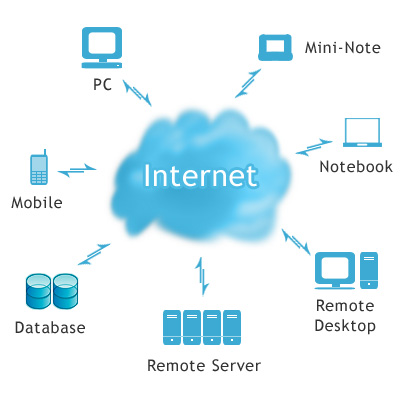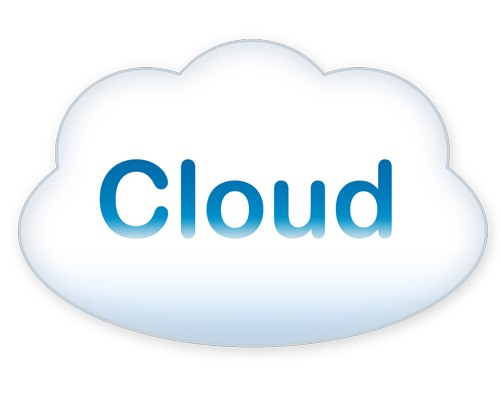Cloud Computing Advantages & Disadvantages

Now a days everyone is discussing about cloud storage, and we can find lots of industry experts stating how great it is. However, the reality is that there are some cons to cloud storage that should not be ignored, as some of them can be devastating. kindly go with the list of pros and cons before you decide to use cloud, otherwise you may find yourself as wrong as regretting your decision.
Cloud computing is a move away from desktop computers and local hard-drive storage. Data and applications are stored on a virtual server and users can access the data stored via the internet through desktop and mobile applications. Cloud storage provides businesses and individuals with the storage capacity needed to deal with massive quantities of data without having to invest in additional, on-site storage servers. Simply put, cloud computing allows users to seamlessly access data and applications on a variety devices, streamlines the information transfer process and makes data stored significantly more accessible.
Cloud Hosting Pros and Cons
Cloud hosting allows users to have access to their applications and data on demand, rather than having to run it on an office server or personal computer. Cloud hosting can save businesses a significant amount of money in both start-up and long-term maintenance costs. Cloud servers are already in place at a remote location, so there is no set-up or special equipment required and server maintenance is included by the service provider. Security for cloud hosting is the primary concern for both individuals and businesses. While cloud storage provides greater protection against data loss to fires and other home or office emergencies, it also poses a risk of confidential information being leaked or “hacked.” During a server outage, cloud users lose access to their work and depending on the type of cloud service, may have problems transferring work from one device to another.
Types of Cloud Servers
Public cloud is a service that makes applications and storage available to the general public via the internet. These services may be offered free of charge or on a pay-per-gig basis. Private clouds are internal cloud servers deployed over a company intranet or hosted data center. Hybrid clouds employ and integrated approach to virtual storage, combining aspects of both public and private cloud computing models.
Public Cloud Pros and Cons
Public cloud is generally less expensive than other types of cloud storage and is much easier to launch. Access to public cloud servers is also easier and pay-per-gig public clouds don’t require a long-term or permanent commitment. The downside is that public clouds operate on a one-size-fits-all approach. Public clouds are not tailored to an individual or organization’s needs and there are fewer management controls for users.
Private Cloud Pros and Cons
Private clouds offer more advanced security and limited server access. Private cloud users share few, if any, resources with other individuals or organizations. Private cloud servers are completely customizable and can be designed to fit the needs of the individual or organization. Private clouds can be secured at almost every level, offering more secure data storage and transfer than public clouds. They are, however, more expensive to deploy and maintain than public clouds and may require a longer-term commitment.
Hybrid Cloud Pros and Cons
Hybrid clouds allow users to customize the rules and policies that govern security and underlying infrastructure. Because both internal and external cloud servers are used, IT managers can decide where specific data and applications should be stored. Storing less sensitive material on the public cloud prevents resource overcapacity while protecting critical applications and data on the private cloud. The primary disadvantage to the hybrid cloud model is start-up cost. This type of storage is usually only employed by large businesses as it requires dedicated internal servers as well as an IT staff for maintenance and operation.
Cost
When it comes to cost, cloud storage are more cheaper than ordinary services. Some services offer 1 GB of storage for less than a dollar, which is hard to find anywhere else. There are also metered automated systems where you are charged based on how much resources i.e memory you are using, so you are only charged for your actual usage and not based on a plan.
Security
Technically cloud storage is much secure than others . The cloud hosting businesses do not want to lose your files, because they lose your business. Due to this, they arrange their system in all proper with major security protocols over their servers. However, this becomes a target for intruders/hackers because it is both a challenge and it is new technoly. This doesn't mean that hackers can crack it/will get through, but it is still something to think about this issue.
Server Memory Capacity
The memory consumption/capacity of cloud storage is typically very high because the memory is stored on huge servers. While it isn’t technically unlimited, these servers should be able to handle critical situation as everything you throw at them without buckling.
Removing Files From Cloud
Lots of cloud hosting companies don't want to remove your stored data from cloud. If you remove all your stored data, then you will no longer need any type of cloud storage, it may create some security problem when you are removing the files. However, if you want your data to be stored strictly on your computers, or if you want to switch cloud companies,then this situation can become a real pain.
Proper Authentication
Anyone can access the cloud system if they have the proper credentials with then, this can make a system more sophisticated . cloud access is possible at any time from any place quickly.
[yframe url='https://www.youtube.com/watch?v=QJncFirhjPg']
Internet Access
This is both advantage and disadvantage at once. If the Internet is readily available and easy to get, then cloud storage will be fast and easy. Not only that, but since the cloud is accessible via the Internet, any computer is capable of retrieving the files from the server.
If you are on a data plan with limited data, then constantly accessing the Internet for large files can become an issue. You may end up going over your bandwidth limit, which normally incurs charges.
Another problem occurs if you don’t have a reliable Internet connection. If you can’t get a good connection, then you can access the server and use your files.
Mobile access Possible
As many peoples using smartphone's with 3G connection,most cloud providers developed an applications for many mobile devices.So its more easy to share anything on-go
Loss of Files due to Server Problem
The worst part of using a cloud hosting company is the chance that all of your files may be deleted. For example, if the company goes under some serious maintenance or the servers crash, then all of your files may be lost forever. It might be true that you own server space, but the company owns the server. If they want to close the servers down for one reason or another, they are perfectly able to do this without repercussion.
Conclusion
If you planing to hosting your files in the cloud is generally a perfect and secure idea that can help you to store many files. While there are some sort of potential problems & issues, they should not interfere with normal functioning. However, it is still a good idea to think of all the potential problems before you sign up for any type of service in cloud storage.
For ready-to-go Cloud hosted software for business, try Apps4Rent . If you need a reliable managed cloud service provider for your IT infrastructure, on-premises or in the Cloud, go to .
Author Bio:
Biljana is a blogger and a writer, especially interested and publishing posts on cloud storage and cloud hosting services worlwide.




